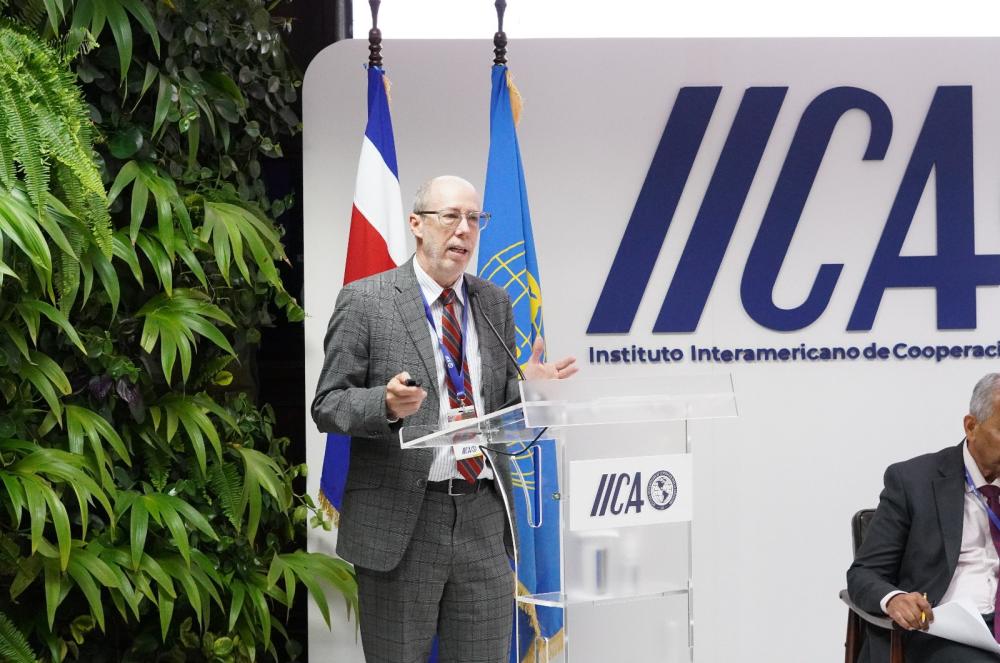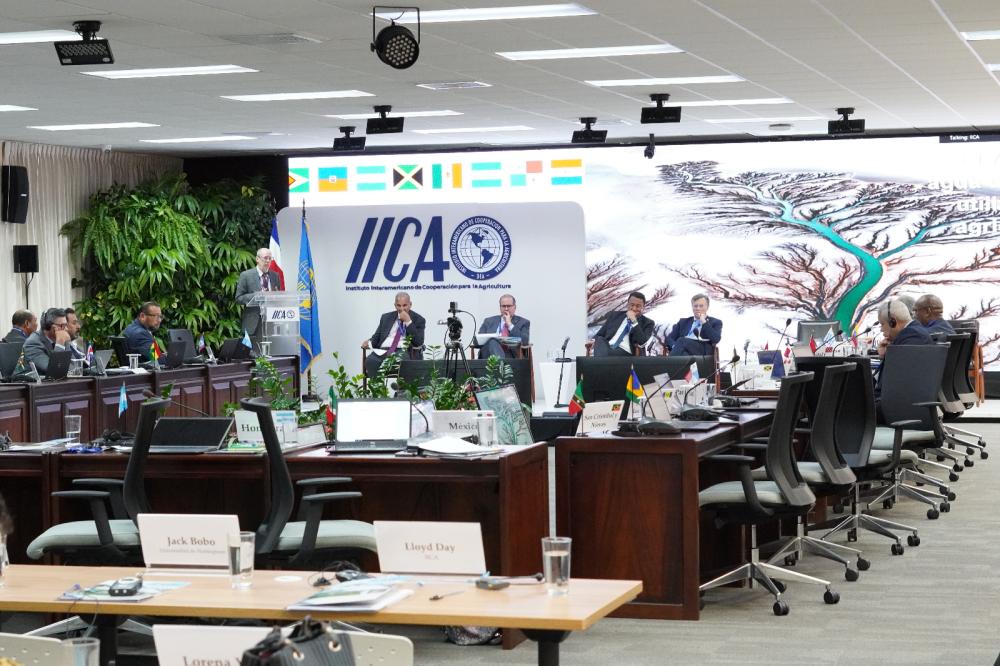To ensure agriculture’s role as part of the solution to the challenges facing humanity, it is crucial to support small-scale farmers, foster cooperation among various stakeholders and improve access to technologies and the quality of life of rural communities. This was the consensus reached by participants in a discussion on the future of agriculture, which was held at the Inter-American Institute for Cooperation on Agriculture (IICA).

San Jose, 24 July 2024 (IICA) – To ensure agriculture’s role as part of the solution to the challenges facing humanity, it is crucial to support small-scale farmers, foster cooperation among various stakeholders and improve access to technologies and the quality of life of rural communities. This was the consensus reached by participants in a discussion on the future of agriculture, which was held at the Inter-American Institute for Cooperation on Agriculture (IICA).
Participating in the panel discussion were Jack Bobo, Director of the Food Systems Institute at the University of Nottingham in the United Kingdom; Álvaro Lario, President of the International Fund for Agricultural Development (IFAD); and Muhammad Ibrahim, Director of Technical Cooperation at IICA. Lloyd Day, Deputy Director General of IICA, served as moderator.
The activity was held as part of the meeting of the Executive Committee, one of IICA’s governing bodies. This yearly two-day work meeting serves as a discussion forum on the most pressing issues related to the role of the Americas in the context of global agrifood systems. In attendance were a dozen ministers of Agriculture of the Americas, senior officials, representatives of international organizations and Leaders of Rurality recognized by IICA for their contributions to production and the well-being of their communities.
The Executive Committee meeting took place at a particularly important time for the agriculture sector, given that the need to produce more food for a growing global population, in harmony with nature, has placed food security at the top of the global agenda.
Changing the narrative
Bobo pointed out that many people have a bad image of agriculture, so the challenge involves changing the narrative.
“The problems we have to face”, he admitted, “are big, complex and of a global scope. The environmental impact is significant, because 40% of land is being used by agriculture, which also uses 70% of fresh water. On the other hand, 800 million people are food insecure. Given this scenario, some people believe that science and innovation have failed”.
However, the renowned academic, who specializes in science communication, pointed out that things are improving, contrary to what many people assume.
“When we understand what the past was like, we can become more hopeful about the future. Food production today is much greater than it was in 1960, and uses only a little more land. If we were still using technology from the 1960s, we would need 1 billion more hectares to produce the food we are producing today”, he remarked.
Bobo also considered that farmers should not be singled out for not doing things right. Instead, they should receive support to do things better, through good communication.
“Sustainability is a journey, not a destination. Agriculture is much better now than it was in the past, and it will continue to improve”, concluded Bobo, who will receive the World Food Prize Foundation’s Borlaug CAST Communication Award this October in Iowa, United States.
“At this time of political and climate uncertainty, we must reflect on the future of agriculture. Latin America and the Caribbean are home to almost one-third of the planet’s freshwater and more than half of the world’s primary forests. Climate change puts all this wealth at risk. Hurricane Beryl recently demonstrated this in the Caribbean”, stated Álvaro Lario.
“IFAD”, he added, “believes that challenges require a multifaceted approach and collaboration between different partners. The future of agriculture is something we not only think about, but also invest in. In close collaboration with organizations such as IICA, we have seen that innovative solutions can substantially increase the resilience of small and medium-scale producers”.

IFAD is an international financial institution and specialized United Nations agency dedicated to eradicating poverty and hunger in rural areas of developing countries. It was established in 1977, when global leaders realized that food insecurity and hunger were not due to failures in food production, but rather structural issues related to poverty.
For his part, Muhammad Ibrahim called for giving greater consideration to climate adaptation and ways to help producers overcome the risks associated with extreme weather events over the years. He also considered joint work to be crucial, in order to attract more youth and foster prosperity in rural areas.
“Science, technology and innovation are key to increasing productivity and also equality. We must strengthen a circular economy that generates multiple products”, he noted.
According to the Director of Technical Cooperation at IICA, some questions that need answers are how agriculture could improve decision making, how it could work with new partners, how it could obtain funding to accelerate the necessary changes, how it could better respond to consumer demands, and how production costs could be lowered.
“Over the next few months”, he announced, “IICA will hold dialogues to discuss the future of agriculture, under a participatory approach including ministers of Agriculture. We are looking to improve our understanding and foster a new generation of public policies”, he explained.
More information:
Institutional Communication Division.
comunicacion.institucional@iica.int











